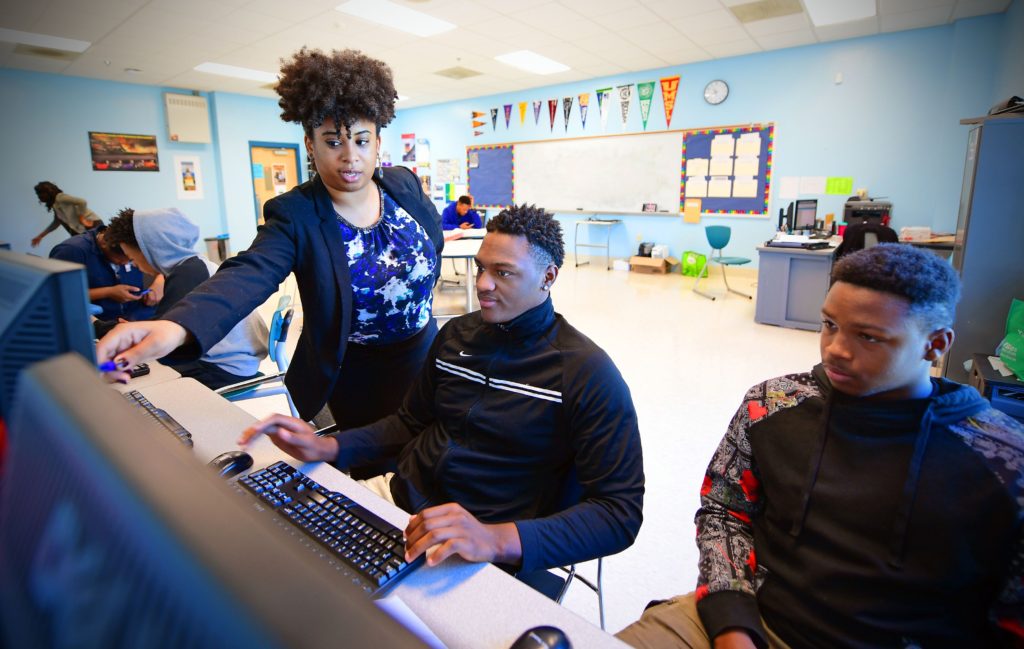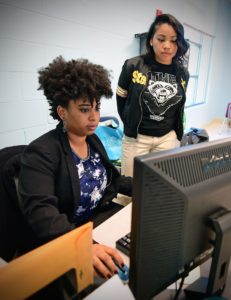
Vashon High School in St. Louis sends only 38 percent of its graduates to college. But, on this day, College Advising Corps adviser and Washington University in St. Louis graduate Erin Waddles is making sure every senior submits federal financial aid forms.
“So many of these students have been told, ‘You can’t go to college — it’s too expensive,’ ” Waddles said. “That is just not true.”
As Waddles makes her way from computer to computer, one student raises his hand and tells Waddles he doesn’t want go to college.
“Do I still have to fill this out,” he asked. “I’m sick of school.”
“Yes, you do,” she answered. “You may change your mind.”
The student shakes his head but does as asked.
“The truth is that he’s really smart,” Waddles whispered. “I’m still working on him.”
This is the first year Washington University has hired its graduates to serve College Advising Corps, a national organization that puts advisers in high schools that serve low-income students. In addition to Vashon, advisers also work in Clyde C. Miller Career Academy and Sumner High School in St. Louis Public Schools; Hazelwood East High School; and University City High School. The advisers work full time on-site, helping students find the right school, navigate the application process and prep for the ACT.
Leah Merrifield, vice chancellor for community engagement and St. Louis college readiness initiatives, said many high schools lack the resources to provide comprehensive college counseling. The national student-to-counselor ratio is 500-to-1.
“There is a real need out there,” Merrifield said. “So we went to schools and said, ‘Is there a way we can help you? Would having a full-time adviser, someone who has been trained and can work one-on-one with your students, make a difference in your school?’ And what we are hearing today is that these advisers are making a positive impact. They’re getting students to apply, to make college visits, to fill out that FAFSA.”
Waddles is paid by Washington University, but considers herself part of the Vashon team. She attends staff meetings and professional development workshops and works closely with the school’s three guidance counselors. Vashon counselor Norma Burnett calls her an “invaluable addition.”
“Students will say, ‘I want to go to this college.’ And I can say, ‘Miss Waddles can help,’ ” Burnett said. “That means I can focus on a child who may be having more serious, pressing problems. We really work as a team.”
Waddles has gained the respect of students as well. Before lunch, senior Davion Stockard drops by Waddles’ office to say hello. The previous Sunday, Stockard and his mother met Waddles at the school to complete his FAFSA.
“I grew up knowing that I would go to college, but I didn’t know where to start,” said Stockard, captain of the football team and an aspiring computer scientist.
First, Waddles analyzed Stockard’s GPA and ACT score and found schools that stacked up academically. Then, Waddles and Stockton discussed what sort of school matched his personality and priorities. Did he want to attend a small college or a large university? Did he want to be close to home or explore a new part of the country? What about the school’s demographics, co-curriculars and support programs? After considering the options, Stockard chose Washburn University, a small university in Topeka, Kan.
“I had never thought about a lot of this until Miss Waddles worked with me,” Stockard said. “Going to college is a nervous step for many of us. We want to go but we don’t know what to expect.”

As a “near-peer,” Waddles, who studied anthropology in Arts & Sciences, can tell students what college is really like. Still, Waddles acknowledges her journey to college was vastly different than that of her students.
Waddles’ parents, both college educated, encouraged her to apply to the best schools and Waddles kept an Excel spreadsheet ranking schools such as Harvard, Yale and Washington University. In contrast, Marniece Doss has been told to not bother applying to selective colleges. She is a straight-A student.
“They say, ‘Kids who live here don’t go to schools like that,’” said Doss, who has applied to 15 schools, including Washington University. “Miss Waddles isn’t one of those people. She has supported me.”
Waddles said she is inspired by students like Doss.
“There are a lot of students here who persevere no matter what they face,” Waddles said. “We have some students who are homeless. We have students who can’t stay after school for ACT test prep because they work two jobs.”
Angela Brooks, director of the College Advising Corps at Washington University, said the corps can’t solve all the complex problems facing many of the students. Still, it is a powerful tool. Next year, the program will expand to eight schools in the St. Louis area.
“I have observed our advisers in action, and it is wonderful to see how they have helped guide high school students onto the path to college,” Brooks said. “The college application process can intimidate anyone, but these advisers are providing expertise and, more importantly, offering support to students who need it most.”
Comments and respectful dialogue are encouraged, but content will be moderated. Please, no personal attacks, obscenity or profanity, selling of commercial products, or endorsements of political candidates or positions. We reserve the right to remove any inappropriate comments. We also cannot address individual medical concerns or provide medical advice in this forum.